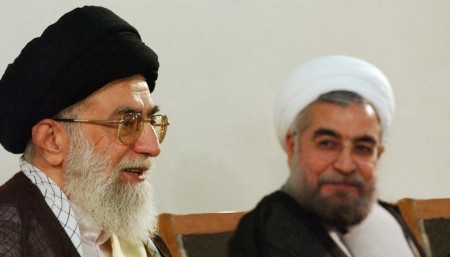The big story from Iran this week was the one that did not make headlines. Sources revealed that President Rouhani struck a deal with the Supreme Leader: in return for Ayatollah Khamenei’s continued support for the interim nuclear deal and further talks, Rouhani would back away from initiatives to open up Iran’s political and cultural space.
Of course, the deal is not public, but its traces were throughout Iranian news and politics during the week. Despite warnings of the difficulties of a comprehensive nuclear deal — and the Supreme Leader’s doubts about parts of an agreement — the Rouhani Government and the US confirmed that discussions will resume in mid-February. The Supreme Leader, through his top foreign policy advisor, backed the resumption.
Meanwhile, Rouhani and his Ministers, threatened with “yellow cards” by Parliament and facing hard-line warnings about any leniency towards “sedition”, pulled back from statements about relaxation of censorship, let alone freedom for political prisoners. Even recent proclamations about the freeing of the Internet were muted.
Instead, the Government’s initiative was on the economic front, with the campaign to renew foreign investment. Rouhani, accompanied by Foreign Minister Mohammad Javad Zarif and Oil Minister BIjan Namdar Zanganeh, attended the World Economic Forum in Davos, Switzerland — his address to the gathering emphasized that Tehran, after years of sanctions and withdrawal of foreign companies, was again open for business.
Rouhani had a series of discussions with representatives of Western firms. The most important was with the oil and gas sector, including executives of BP, Italy’s Eni, Royal Dutch Shell, Saudi Arabia’s Aramco, and France’s Total.
On the lighter side, Iran’s propaganda outlets — notably the Revolutionary Guards’ Fars News — entertained with tales of US-Zionist-Takfiri conspiracies in Syria and President Obama’s plan to de-populate the state of Montana.
FORECAST
The Supreme Leader’s backing ensures that the Rouhani Government will go to the mid-February talks with the 5+1 Powers with sanction to pursue long-term arrangements on uranium enrichment and sanctions relief — providing hyped-up US stories that Tehran is refusing to “dismantle” its nuclear program do not undermine the discussions.
But that approach, as well as Iran’s attempt to keep a hand in maneuvers over the Syrian crisis, will ensure that the Rouhani Government stays away from any controversial moves over politics and culture. Opposition leaders Mir Hossein Mousavi and Mehdi Karroubi will enter a fourth year under strict house arrest, with many other political prisoners remaining behind bars.
The Government’s effort, bolstering its legitimacy as well as reviving Iran’s fortunes, will be on the economic front. Rouhani’s declared hope to bring inflation down to single digits within three years points to a “stability” which he hopes will bring in badly-needed trade and investment.
So far, the President and his advisors have the political space — in contrast to the Ahmadinejad Government’s battle with Parliament — to pursue that goal.
FEATURED ANALYSES
Special: Rouhani & Supreme Leader Deal – Protecting A Nuclear Agreement, Giving Up Political Prisoners & “Freedom”
Tehran’s Latest Scoop “Obama Plans to Depopulate Montana — Civil War a Certainty”
Can New US-Zionist-Western Conspiracy Help ISIS & Iran’s Revolutionary Guards Find Common Ground in Syria?

